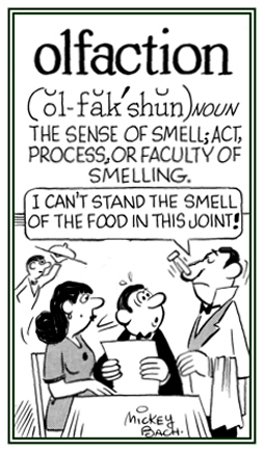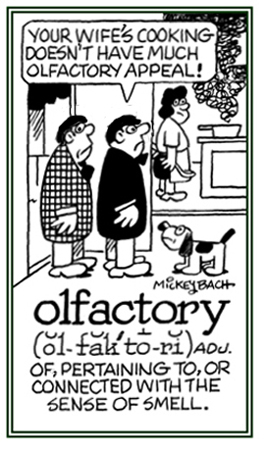olfacto-, olfact-
(Latin: to smell; pertaining to the sense of smell; scent; to cause to smell at)
From Latin olfactorius, from olfactus, olfacere, "to get the smell of, to sniff"; from olere, "to smell" + facere, "to make, to do".

Go to this Word A Day Revisited Index
so you can see more of Mickey Bach's cartoons.
2. A device for estimating the sensitivity to different odorants.
2. A determination of the degree of sensitivity to odorants.

Go to this Word A Day Revisited Index
so you can see more of Mickey Bach's cartoons.
2. The area of nasal mucosa in which the olfactory organ is situated.
One olfactory area is at the base of the brain through which numerous small branches of the anterior and middle cerebral arteries enter the depth of the cerebral hemisphere.
2. A key part of the olfactory apparatus consisting of a bulbous enlargement of the end of the olfactory nerve on the under surface of the frontal lobe of each cerebral hemisphere of the brain just above the nasal cavity.
As for changes in the perceptions of olfactory disorders, some people notice that familiar odors become distorted, or an odor that usually smells pleasant instead smells foul.
Olfactory disorders have many causes.
Most people who develop an olfactory disorder have recently experienced an illness or an injury.
Common triggers for olfactory disorders are colds and other upper respiratory infections and head injuries.
Among other causes of olfactory disorders are polyps in the nasal cavities, sinus infections, hormonal disturbances, or dental problems.
Exposure to certain chemicals; such as, insecticides and solvents, and some medications have also been associated with olfactory disorders.
People with head and neck cancers who receive radiation treatment are also among those who experience problems with olfactory disorders.
Olfactory disorders can have serious consequences; for example, the sense of smell often serves as a first warning signal, alerting us to the smoke of a fire or the odor of a natural gas leak and dangerous fumes.
Perhaps more important is that our chemosenses are sometimes a signal of serious health problems. Obesity, diabetes, hypertension, malnutrition, Parkinson's disease, Alzheimer's disease, multiple sclerosis, and alcoholic psychosis are all accompanied or are signaled by chemosensory problems resulting in olfactory disorders.
Inter-related cross references, directly or indirectly, involving word units meaning "smell, odor": arom-; brom-; odor-, odori-; osmo-; osphresio-; ozon-.

